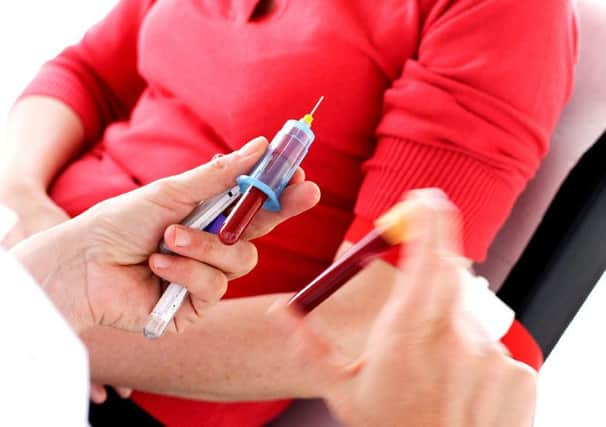Whitehall defends '˜gay blood' celibacy rules


Although Northern Ireland fell into line with Great Britain yesterday by lifting the permanent ban on gay men from donating, the move was replaced by the UK-wide policy of requiring them to be celibate for 12 months before giving blood.
Sinn Fein, the SDLP, Alliance and the Rainbow Project all blasted the new rule as discriminatory when compared to those for heterosexual blood donors.
Advertisement
Hide AdAdvertisement
Hide AdBut a spokeswoman for the Department of Health in Whitehall - which sets the policy - told the News Letter yesterday that it remains in place because gay and bisexual men continue to have statistically higher levels of blood-borne infections and sexually transmitted infections.
A Department of Health spokeswoman said: “The latest available UK evidence shows that as a group MSM [men who have sex with men] continue at statistically higher levels of blood-borne infections and sexually transmitted infections.”
For example, only 2.4% of adult men have sex with other men - yet 54% of the new cases of HIV in 2014 were within this same group, she said.
“Men who have sex with men remain a priority for targeted HIV and STI prevention and health promotion work,” she added.
Advertisement
Hide AdAdvertisement
Hide AdExplaining why the 12 month celibacy period is imposed on sexually active gay and bisexual men, she said that a newly acquired infection may still be in a ‘window period’ where it cannot be detected by screening tests.
If unidentified, the donation of such blood could end up infecting other patients, she said.
“Some infections such as hepatitis B have window periods exceeding several weeks, and on a precautionary basis SaBTO [the advisory committee on the Safety of Blood, Tissues and Organs] recommended 12 month deferral.
“This period is considered sufficient to allow for the complete clearance of hepatitis B in a recovered individual, and those individuals who do not recover will then be detected by the tests.”
Advertisement
Hide AdAdvertisement
Hide AdThe same 12 month deferral period was adopted by the US in 2015, she added..
However five years after the rule was introduced in the UK, it is now under review by SABTO in consultation with LGBT organisations, with a report due to be published in 2017, she said.
Yesterday Alliance MLA Kellie Armstrong welcomed the end of the permanent ban in Northern Ireland.
“However, to only allow celibate gay men to donate is still a major form of discrimination which reinforces negative stereotypes about gay men in particular,” she said.
Advertisement
Hide AdAdvertisement
Hide Ad“It only feeds into the absurdity which surrounded the blood ban in the first place.
“Repeal of the ban is certainly a good first step but that is precisely all it is – a first step.
“More needs to be done to achieve full equality and I would urge the Minister to look at the evidence and take the rest of those steps immediately.”